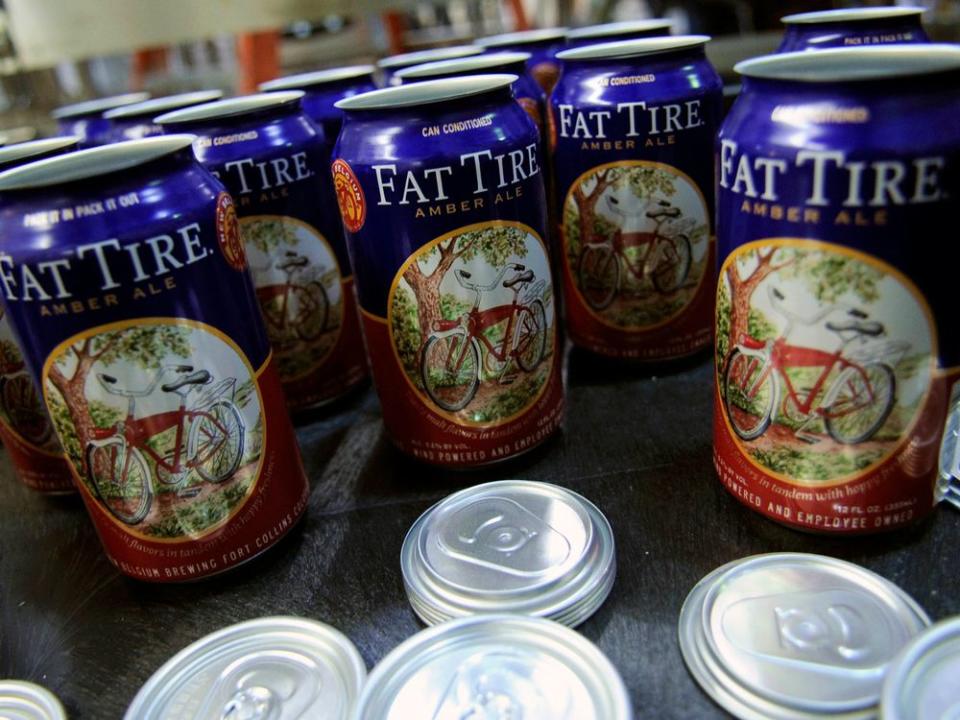New Belgium Sells to Kirin as the First Wave of Independent Breweries Grapples With Middle Age
Yesterday, America's craft brewing industry received news of a massive international buyout: Colorado-based New Belgium Brewing—best known for Fat Tire—will be acquired by Lion Little World Beverages, "the global craft beverages business of Australasian brewer, Lion"—a company which, itself, is owned by the Japanese conglomerate Kirin Holdings Company Limited.
According to the Brewers Association (BA)—the trade group for small and independent craft brewers—New Belgium was the fourth largest craft brewery in America. And assuming this deal goes through as expected, they'll become the highest ranking brewery on that list to ever be stripped of their official BA "craft" designation.

The impact is huge for craft brewing—because it's so significant, but also because it's oddly not significant at all. Craft breweries "selling out" to larger brewers has been a huge topic of conversation for nearly a decade now—and the reason that conversation has continued is because sellouts have become commonplace. With New Belgium's decision to sell to Kirin, we've likely reached a turning point, officially ushering in a new age of "craft."
Admittedly, the definition of a "craft brewery" has always been amorphous anyway: The BA has repeatedly tweaked its definition—often times simply to keep some of its biggest members in. But looking down the BA's landscape now, the list finally feels at odds with itself.
At the top is Yuengling, a brewery that was actually retroactively added to the list in 2014 due to a definition change—and whose generations of family ownership feel more impressive now seeing how the craft beer industry has evolved since. Next is Boston Beer Company. Clearly, as the maker of Sam Adams, Boston Beer has been of the utmost importance to craft beer, but by the company's own admission, much of its energy recently has been focused toward its other brands like Angry Orchard Cider and Truly Hard Seltzer. And that's not to mention that, this year, Boston Beer itself merged with another major craft brewery, Dogfish Head. Third on the list is Sierra Nevada, recognized as a true bastion of modern craft beer, but also a company that made its first acquisition in 2019, buying out the functional craft beer brand Sufferfest.
Meanwhile, Boston Beer and Sierra Nevada aren't the only breweries in the BA's top ten realizing the need to work together with other brands: Duvel Moortgat (#5), Gambrinus (#6), and CANarchy (#8) are all made up of multiple brewers and brands.
So if many of the breweries atop the BA's list are, themselves, mini-conglomerates, what does that say about craft beer? The simplest explanation is that it says craft beer has changed. The stylistic, financial, and ethical ideals of craft beer may still exist, but over the course of a successful four-decade journey—where craft beer started as a blip on the map in the 1980s to a point where over 7,500 breweries produce craft beer today—you can't expect the companies that began that fight 40 years ago or 30 years ago or even 20 years ago to operate in the same way a small upstart brewery does now. If the New Belgium of today were the same as the New Belgium of the ‘90s, that wouldn't be success, that'd be stagnation. As such, we can't hold breweries to the standards that we did a generation ago.
In 2012, New Belgium made headlines by becoming a 100-percent employee-owned company. And in a letter to the brewery's fans after the acquisition announcement, co-founder Kim Jordan, a craft beer legend, played up that fact. "We will no longer be employee owned and it would be easy to see that as a drawback," she wrote. "But here's another way to look at it. More than 300 employees are receiving over $100,000 of retirement money with some receiving significantly greater amounts. Over the life of our ESOP, including this transaction, the total amount paid to current and former employees will be nearly $190 million."
Those aren't the words of craft beer dying. That's craft beer hitting middle age and making some hard decisions about its future. The irony is that just as these original craft brewers led the ugly battle against a brewing industry that was stacked against them, they are also demonstrating the ugly realities of dealing with a more mature industry—and, as is the case with Jordan, doing it in your 60s when you have hundreds of employees counting on you not to muck it up.
The unfortunate truth is that though new craft breweries can keep the youthful energy of craft beer alive, craft brewing as a movement will never have the same energy as those early days of Ken Grossman homebrewing what would become Sierra Nevada Pale Ale in the ‘70s or Jim Koch recreating his great-great-grandfather's recipe in the ‘80s—just like rock ‘n' roll will never truly recapture the days of The Beatles and The Stones. Neil Young famously sang, "It's better to burn out than to fade away," but then doubled back on that sentiment when Kurt Cobain included the line in his suicide note. It speaks to an important point: Both options suck. There's no perfect way to reach the end of a creative career. And the first-generation rock stars of craft brewing are realizing that now more than ever.
"This is not the last chapter, there's more fun to be had," Jordan wrote towards the end of her letter to fans. That might be true, but that's also not the kind of thing you say unless people might misconstrue your decision as the last chapter. Her same sentiment could be used for craft beer in general: Craft beer isn't finished, but we're way past the introductory chapters. And yes, there's more fun to be had, but someone else is writing the sequel. They're doing an amazing job; we've already been tasting the prologue.

